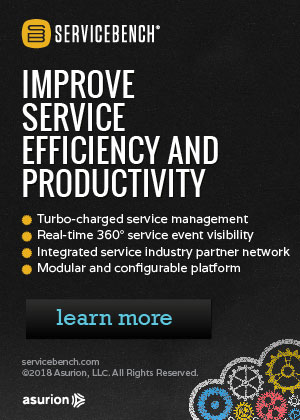Warranty Investments:
One Wall Street-weary extended warranty administrator is going private while another was swept up by an acquisitive company out to corner the market for mobile phone extended warranties. And then there's ServiceBench, carefully planning its next logical step.
For a little over a year, numerous investors have been sniffing around the extended warranty industry, looking for a place to put their money. To some extent, a few of them found their spots in the past few weeks, as Warrantech Corp. and Warranty Corporation of America were acquired, and then as ServiceBench Inc. closed on its fourth round of venture financing.
It wouldn't be surprising if a few more extended warranty administrators, underwriters, or service providers change hands in the next few weeks or months, as those investors who haven't yet found a place to put their money to work make their moves. After all, it was probably the announcement two years ago of an investment in N.E.W. Customer Service Companies Inc. that made everybody sit up and take notice of the industry. It's still far from a feeding frenzy or, heaven forbid, a bubble, but the days when only a handful of company insiders paid attention to the extended warranty industry are now officially over.
Warrantech will be acquired by H.I.G. Capital LLC in a $35 million deal that includes the assumption of $20 million in Warrantech debt plus a cash payment of 75 cents per share. The deal, expected to close by year's end, was approved unanimously by Warrantech's board of directors, and is likely to also be approved by shareholders, since the owners of more than 35% of those shares have already indicated their intent to vote yes.
H.I.G. Capital, we should note, is also an investor in Service Net Solutions LLC, a third party administrator that was acquired and divested by the Kemper Insurance Companies several years ago. No plans have been mentioned to combine Warrantech or Service Net in any way, but isn't it interesting that they should end up as step-siblings.
Wireless Extended Warranty Leader?
The Warranty Corporation of America was acquired by the Asurion Corp., an acquisitive company that calls itself "the leading provider of enhanced services to the wireless telecommunications industry." Last year, Asurion announced the acquisition of lock\line LLC, a subsidiary of DST Systems Inc. which also focused on the insurance of wireless equipment. Last month, Asurion acquired Lumitrend, a company which provides data backup services for the contents of mobile phones, such as ringtones, pictures, and contacts.
As is customary in cases where one private company buys another private company, all the details of these transactions were kept private. Warranty Corp. of America will continue to focus on service contract administration, and will now become a wholly-owned subsidiary of Asurion. About the only meaningful change at WaCA so far has been the installation of Doug Tudor as president. He had been vice president of corporate development at Asurion.
And then there's ServiceBench, a company that counts not only many of the major third party administrators as clients, but also numerous major retailers and manufacturers as well. If the whole universe of service contract stakeholders were each represented by a spoke, ServiceBench would be the hub in the middle.
 Rather than selling the company to one of these stakeholders, however, management has decided to close on a fourth round of private equity financing that will bring the company $7.3 million from a mixture of new and existing investors. Michael Dering, ServiceBench president and CEO, said that money is going to fund incremental growth into new sectors of the service business as well as some new international markets.
Rather than selling the company to one of these stakeholders, however, management has decided to close on a fourth round of private equity financing that will bring the company $7.3 million from a mixture of new and existing investors. Michael Dering, ServiceBench president and CEO, said that money is going to fund incremental growth into new sectors of the service business as well as some new international markets.
"ServiceBench has been around for almost six years now," he said, "and we're the proven leader in on-demand service management solutions. We've been proving this solution out through the verticals that we're dominant in: appliances and consumer electronics. And now that we think we've got it all down, and now that we've created a lot of traction -- obviously our solution works and our customers are very happy with it -- we want to build in other verticals. And we want to go international too."
Specifically, he said ServiceBench will delve deeper into verticals such as heating, ventilation, and air conditioning, as well as into heavy equipment. In addition, it will see whether the service network management and dispatch resources it currently has at its command can help it make a deeper penetration into the computer repair industry.
"Each vertical is a little different in its nuances," Dering said. "And we don't want to just sell our solution set into verticals or to customers. We'd like to get to know the verticals, and to be the industry expert of that vertical. So we really take our time. After we pick out one of these verticals, we really dig deep."
Internationally, ServiceBench already has a presence in Mexico, with plans to expand deeper into Latin America. By year's end, Dering said the company will have a presence in Europe. "We think we now have the recipe down," he said. "Now, we want to expand out."
No ServiceBench IPO Plans?
Dering seemed less enthusiastic about preparing for an initial public offering of ServiceBench stock. A decade ago, a company like ServiceBench might have skipped both the fourth and perhaps even the third round and gone right for an IPO that instantly valued the company into the stratosphere. If the stock price didn't double or triple in the first few hours, dot-com stock watchers like Henry Blodget would have deemed it a failure. Now, except for companies like Google, IPOs are less common, and stocks that double or triple on their first day of trading are exceedingly rare. Then again, someday IPOs may come back into fashion, and once again we'll all become day traders.
"Nothing is impossible," Dering said, "but our focus right now with the money is to continue to grow the business. And then we'll see what happens."
Right now, ServiceBench is in the enviable position where new investors seek them out, and existing investors never leave. Back in 2004, JMI Equity Fund led the third round of funding, which raised $3.2 million. At the time, Dering said, Valhalla Partners was just starting out and wasn't really in a position to participate. However, Dering kept in contact with Valhalla general partner Hooks Johnston over the years, and when it came time for this fourth round, Valhalla joined with JMI and ultimately took the lead itself. Johnston will now join the ServiceBench board, Dering said, where his experience with running technology companies is expected to come in handy.
Historically, Dering said, ServiceBench has raised a little more in each successive round, but not much more. In 2004 it was $3.2 million. This round, it was $7.3 million. But it wasn't $73 million. Remember the bubble days, when a sketch on the back of a napkin could raise millions? "No use in raising a lot of money and failing," he said. He said he'd rather raise just what he needs to get to the next incremental step.
Heavy Investor Interest
"I get calls at least once a week, if not more, from investors wanting to know about us," Dering said. Some simply want to know what's going on in the industry, because most of the players are privately-held and there are not a lot of information sources. Others want to know if ServiceBench is looking for money. It is, or it was, but it wasn't really looking for new investors. "It's gratifying to be the CEO of a company where we get to pick the investors," he said, "not the investors get to pick us."
The ServiceBench network went live in the fall of 2000, with the first customers being Frigidaire for the aftermarket servicing needs of its laundry, food, heating, cleaning and cooking appliances; and Shindaiwa Inc. for its line of chain saws, trimmers, edgers, blowers, and sprayers. A year later, ServiceBench signed Whirlpool Corp., and began to focus not only on claims management, but also on dispatch. Then along came Sears, Electrolux, Sony, Mitsubishi, and numerous other customers.
Back in 2000, it was fashionable to talk about online services as application service providers or as outsourcers. But most of the ASP efforts back then focused either on office work or on purchasing. Millions of dollars were raised, and millions of dollars were lost. By the time the bubble burst, the ASP concept was thoroughly discredited.
Yet here is ServiceBench, six years later, providing aftermarket services to multiple enterprises who now probably couldn't do without it. Essentially, ServiceBench found a niche service it could do better than any one company could on its own -- one which these companies were more than happy to outsource.
Dering declined to talk revenue or growth rates, but he noted that ServiceBench has been incredibly busy lately. The headcount now -- 74 people -- could increase by as much as 30% by year's end. "So things are going good," he said.
Warrantech Turning a Corner?
At Warrantech, meanwhile, gross revenues were up nearly 5% for the nine months ended Dec. 31 to just under $94 million. The net loss was more than halved, from $2.4 million in the first nine months of fiscal 2004 to under $1.2 million in the most recent period. The stock, which ended a three-year slide only a few months ago, is now trading at around 70 cents a share, more than double what it was at the bottom of the curve.
Back in late 2003, company management attempted to take the company private at $1.65 a share, but that offer expired without being accepted. At the time, Warrantech CEO Joel San Antonio had nothing nice to say about life as a public company, and seemed eager to go private. "We are the only independent public company left in our industry, and in today's environment being public places us at a competitive disadvantage," he said in a Sept. 19, 2003 press release. "SEC reporting and other public company responsibilities cost us up to $1 million a year, but our low stock price and lack of investor interest provides us none of the benefits. It�s just possible that our line of business may be better off in the private sector."
Now H.I.G. Capital will give San Antonio and his team a chance to work for a private company, if this deal closes as expected by year's end. Richard Gavino, Warrantech's executive vice president and chief financial officer, told Warranty Week that an investment banker introduced Warrantech to the principles at H.I.G. around the beginning of this year. Because of their previous experience with Service Net, they were already familiar with the industry. And because Warrantech was for so long a public company that had to file its financials with the U.S. Securities and Exchange Commission, they were already familiar with the company they were proposing to buy.
No Merger Plans With Service Net
"Investment bankers, if they like a space, then obviously they take an interest in it," Gavino said. "And hypothetically, they might have more than one bet in the industry." But that doesn't mean that H.I.G. has any interest in merging Warrantech and Service Net. Over the years, the company has made multiple other overlapping and competing investments.
Gavino said he also sees a noticeable upturn in investor interest in the extended warranty industry. "I would say there's certainly more interest today than there was years ago," he said. "I think people are recognizing the magnitude of the industry itself, and the value created by the industry."
Others may dream of IPOs and their company names reduced to stock symbols. But Gavino said he's had his fill. "The current reading that I show is more small and mid-sized companies are getting out of the public arena because of the undue scrutiny and cost of being a public company," he said. "I think companies are finding that the public markets are not the only markets as far as a strategy for an exit or the sale of a business."








